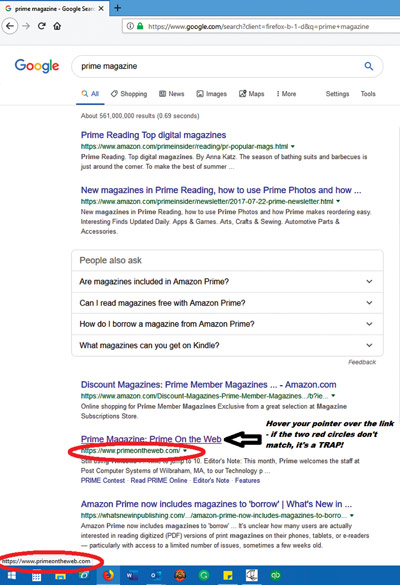
Editor’s Note:This month, the tech consultants at POST Computer Systems of Wilbraham, MA, begin a deep dive into one of the scariest things that can happen to your devices – getting “infected” by a virus or malware.
By Kate Thresher and The Team at POST Computers
prime@pocosys.com
It seems like everywhere you look on the computer nowadays, there are threats of computer viruses, trojans, and malware but no clear explanation on what they are and, more importantly, how to avoid them.
Hackers and other cyber-scammers hide traps all over the Internet, just hoping and waiting for some unknowing person to run into them. The only thing you can really do to protect yourself is to make sure that you aren’t one of the “unknowing.”
An ‘infection’ by any other name
First thing’s first: viruses and malware are not the same thing. There are technical differences that for the average user are not important. For the sake of the following article, we’ll simply generalize the above into “computer infections” or “infections.”
It’s easy to pick one up
Computer infections can sneak their way into your computer through downloads, needless searching, and mislabeled links. When it comes to downloads, always make sure you are going to the right site to download. Adobe reader, for example, is a pretty common download – most people end up needing it at one point or another. However, instead of doing a Google search for “adobe reader download” go directly to adobe.com. Once you are there, you are generally safe from sneaky infections.
As far as searching goes, Google is a wonderful thing. There’s a wealth of knowledge available and searching is a very helpful tool. However, if you know where you want to end up, there’s no need to search for it. For example, if you are looking for new campfire chairs and you know you want to order from Amazon, go to the top search bar, type in www.amazon.com, and search for campfire chairs there. Once you are on Amazon.com, searches are closed and much safer. This works for most websites.
Watch what you click
Mislabeled links are a little bit harder. Unfortunately, in today’s world, hackers can make a link say anything they want. This means that when you are searching for a fun new pasta salad recipe to bring to a summer cookout, “fiesta pasta salad recipe” at pastasaladisyummy.com could really be a trap.
The only way that you can protect yourself against mislabeled links are by looking before you leap. When you hover over any link – whether it be a search result or a picture link – the location in which you are going comes up in a little box. Usually this is a white box that appears in the bottom left-hand corner of your computer screen – but it will occasionally come up right next to your on-screen pointer (mouse).
If what is in the box does not sound like where you are trying to go, it’s a TRAP! So, if pastasaladisyummy.com comes up as interest19329-col/47/abo.con in the little white box – find a new pasta salad recipe!
Those sneaky pop-ups
Pop-ups are probably the most common form of infectious attacks. These do just what their name implies – they literally pop up on your computer screen when you are in the middle of browsing the internet.
These messages can be anything from “Click here to purchase a subscription” to informing you that you are already infected – we have even seen some of these pop-ups talk, warning of financial or data loss! The “bad guys” will often throw in a name that you know and trust, such as Microsoft, Mac, or the FBI.
Although they look official, these pop-up warnings are nothing but a trap. Most often, the infection only comes by clicking on the box, and the danger is in calling the number that promises to help you.
You can close most pop-ups by pressing and holding the ALT key and the F4 key. This keyboard shortcut is universal to close the active (read: popped up) window. You may have to press it more than once, but most of the time this works. If it doesn’t work – or if you forget the shortcut – you can always press and hold the power button to shut the system off completely. If the attacks persist, it is best to contact your local service company to get the computer cleaned and checked by a professional.
** Check back in the next issue of Prime for part 2 of this Defensive Driving for Your Computer series.
POST Computer Systems has been serving the Western Mass. community since 1992. Started in a basement in Wilbraham, the company continues to grow year after year thanks to the strength of their service department and the continued support from the local community.
If you have any questions or concerns, or to request a future Prime article topic, please reach out to the crew at POST Computer Systems by emailing: prime@pocosys.com